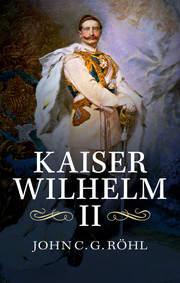Book contents
- Frontmatter
- Dedication
- Contents
- List of figures
- Acknowledgements
- Preface to the English edition
- Preface to the German edition
- Acknowledgements
- Overview: Wilhelm the Last, a German trauma
- Part I 1859–1888: The Tormented Prussian Prince
- Part II 1888–1909: The Anachronistic Autocrat
- Part III 1896–1908: The Egregious Expansionist
- Part IV 1906–1909: The Scandal-Ridden Sovereign
- Part V 1908–1914: The Bellicose Supreme War Lord
- Part VI 1914–1918: The Champion of God’s Germanic Cause
- Part VII 1918–1941: The Vengeful Exile
- 28 A new life in Amerongen and Doorn
- 29 The rabid anti-Semite in exile
- 30 The Kaiser and Hitler
- Notes
- Index
29 - The rabid anti-Semite in exile
Published online by Cambridge University Press: 05 September 2014
- Frontmatter
- Dedication
- Contents
- List of figures
- Acknowledgements
- Preface to the English edition
- Preface to the German edition
- Acknowledgements
- Overview: Wilhelm the Last, a German trauma
- Part I 1859–1888: The Tormented Prussian Prince
- Part II 1888–1909: The Anachronistic Autocrat
- Part III 1896–1908: The Egregious Expansionist
- Part IV 1906–1909: The Scandal-Ridden Sovereign
- Part V 1908–1914: The Bellicose Supreme War Lord
- Part VI 1914–1918: The Champion of God’s Germanic Cause
- Part VII 1918–1941: The Vengeful Exile
- 28 A new life in Amerongen and Doorn
- 29 The rabid anti-Semite in exile
- 30 The Kaiser and Hitler
- Notes
- Index
Summary
A return to the throne would have meant anything but jubilant celebrations. Instead, his restoration would almost certainly have sparked a bloody civil war, and probably also war with Poland, Czechoslovakia, France and Britain. Throughout the world Wilhelm was hated as the man whose overweening militarism on land and at sea and whose expansionist urge for supremacy had brought about the disaster of the Great War. He was wanted as a war criminal and probably escaped conviction and banishment to Devil’s Island or its like only because the Dutch government refused to hand him over to the victorious powers, which were intending to try him in the Palace of Westminster. In Germany itself he had forfeited what remained of any veneration for the Hohenzollern monarchy after his thirty-year rule by his ignominious flight to the Netherlands. The revelation by the Bolsheviks of his correspondence with Tsar Nicholas II and the publication of his marginal comments during the July crisis of 1914 and of the memoirs of his contemporaries that followed the collapse in 1918 completely outweighed Wilhelm’s own memoirs, which proved powerless against the weight of all this condemnation. Soon he descended into a nightmare of violent paranoia, obsessed with the idea that satanic machinations had been at work to destroy him and everything noble for which he had chivalrously fought throughout his life, and was still fighting for: the true Germanic God, the Bible cleansed of Jewish and Roman contamination, the autocratic Prussian military monarchy of his illustrious forefathers, the German Reich restored to its former strength and freed from the chains of the Anglo-French Entente and from the dictated peace of Versailles, once again ready, with the aid of its glorious army, to assume its rightful place among the foremost powers of the world.
- Type
- Chapter
- Information
- Kaiser Wilhelm IIA Concise Life, pp. 185 - 187Publisher: Cambridge University PressPrint publication year: 2014

